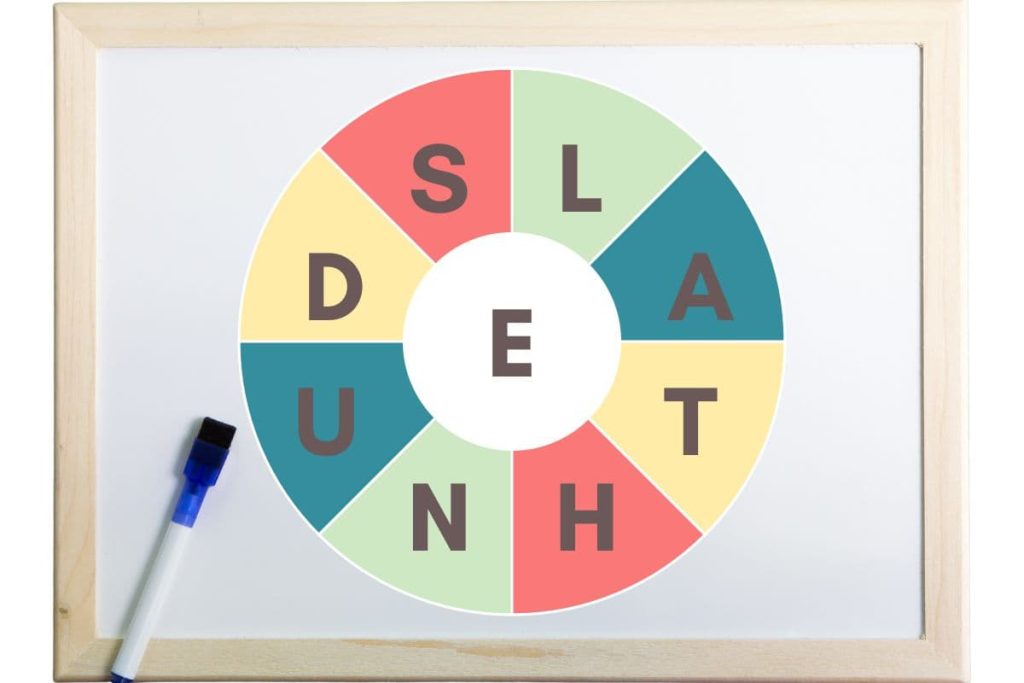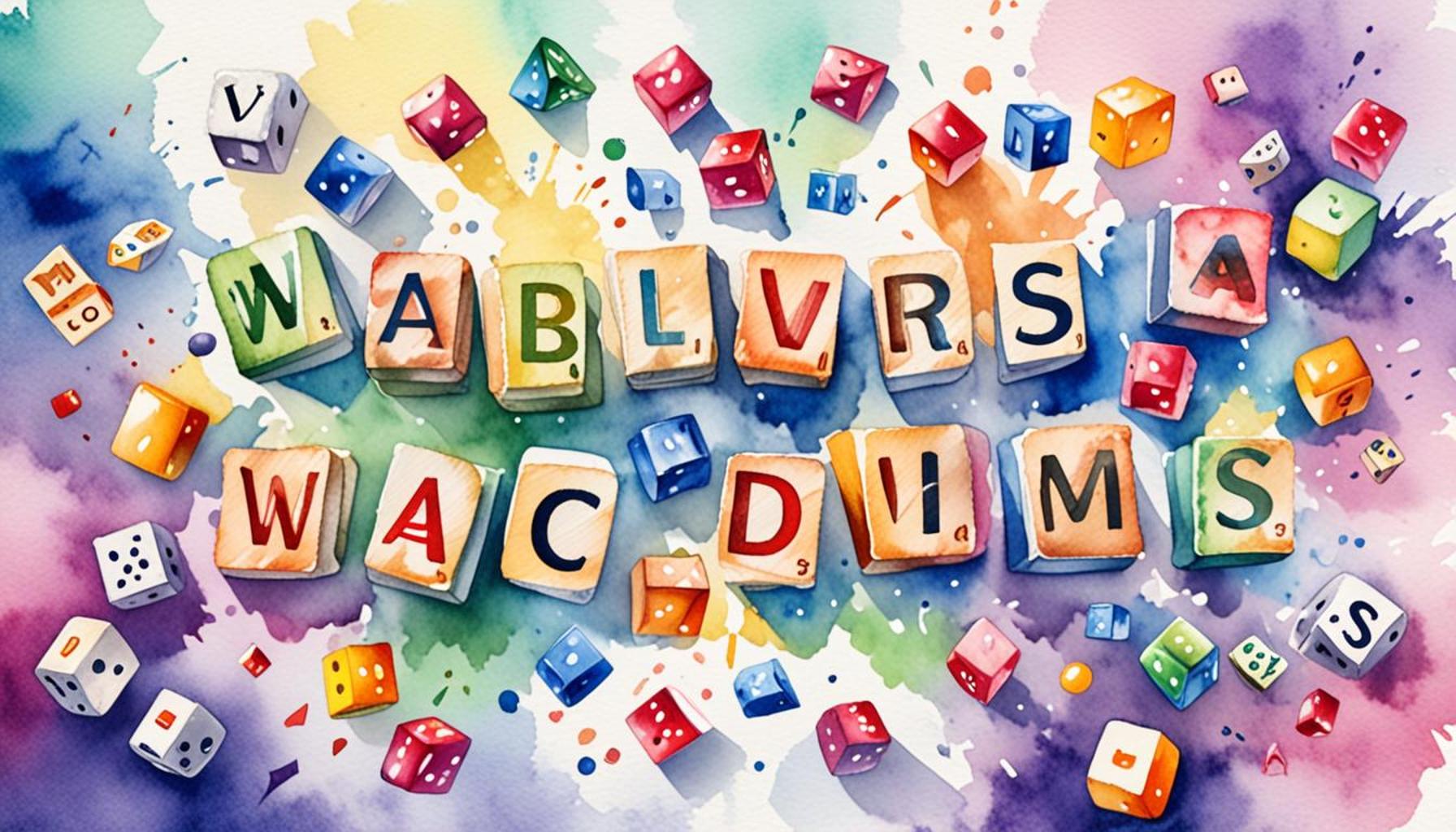How Word Games Stimulate Creativity and Problem Solving

The Hidden Advantages of Playing Word Games
In an era dominated by rapid technological advancements and instant information access, the need for enhancing creativity and problem-solving skills cannot be overstated. Word games, often underestimated as mere leisurely distractions, serve as a practical tool to cultivate these essential cognitive abilities. From well-loved classics like Scrabble to engaging digital applications that feature word puzzles, the potential of these games extends far beyond entertainment.
Let’s explore some key features that contribute to the significant benefits of word games:
- Enhanced Vocabulary: Engaging with word games exposes players to a plethora of new words and phrases, thereby enriching their linguistic repertoire. For example, when playing Scrabble, players often discover uncommon words, which can lead to deeper conversations or improved writing skills. This also fosters a love for language, encouraging more reading and learning outside of the game.
- Cognitive Flexibility: Navigating through different letters and words not only flexes your vocabulary muscles but also enhances adaptability—an essential skill in both everyday and complex problem-solving scenarios. It encourages players to think quickly and adapt their strategies based on new information or pressures, much like how one must adapt in dynamic professional environments.
- Critical Thinking: Many word games necessitate strategic planning and quick decision-making, which sharpen analytical skills. For instance, in a game of Boggle, players must not only be quick in forming words, but they also need to recognize patterns and probabilities in order to maximize their score.
The versatility of word games is another factor that underscores their widespread appeal. Suitable for all ages, they can be enjoyed alone, in pairs, or as large group activities. This aspect nurtures social interaction and collaboration, providing an ideal setting for friends and family to bond over competition and laughter. For instance, community events often feature word tournaments, encouraging local engagement and fostering a sense of belonging.
Research has demonstrated that regular engagement with word games can yield impressive improvements in cognitive functions. An intriguing study found that students who played word games showed enhanced performance in standardized tests, particularly in reading comprehension and verbal abilities. As a result, these games evolve from simple pastimes into valuable instruments for developing mental agility and inspiring creativity.
As you delve further into the world of word games, you will uncover the profound impact they can have on your cognitive processes and creativity. They are more than just games; they are an invitation to unlock your potential and explore the wonderful nuances of language and thought. Are you ready to dive in and discover what these engaging puzzles can do for your mind?

DIVE DEEPER: Click here to uncover more insights
Unlocking the Power of Language through Play
Word games promote a unique intersection of enjoyment and intellectual development, proving to be powerful tools for stimulating both creativity and problem-solving skills. By engaging in these games, players activate various cognitive processes that enhance their ability to think critically and creatively, skills that are invaluable in both personal and professional contexts. So, how exactly do these games spark such transformative thinking?
One of the primary mechanisms by which word games stimulate creativity is through the encouragement of lateral thinking. This form of thinking involves looking at a problem from different angles and finding unconventional solutions. For instance, games like Word puzzles challenge players to see connections between seemingly unrelated letters, prompting them to think outside the box. The variety of possible word combinations allows for innovative approaches and can foster a mindset open to unusual ideas—a trait so crucial in creative fields like art, marketing, and technology.
Moreover, engaging with word games encourages a playful exploration of language. This immersive interaction aids players in uncovering new ways to express themselves, leading to a heightened sense of originality and inclusivity in their thoughts. Players are often required to form words from limited letters, which cultivates resourcefulness. This exercise mirrors real-life problem-solving, where constraints demand ingenuity and creativity.
Consider the ways that word games enhance linguistic skills and cognitive flexibility. Through regular practice, players become more adept at manipulating language, which sharpens their ability to communicate effectively. A well-developed vocabulary not only improves personal expression but also facilitates better collaboration with others. This ability to articulate thoughts clearly enhances a player’s capacity to present ideas and solutions persuasively, a vital skill in any field of work.
Additionally, cognitive studies substantiate the link between play and enhanced performance in various mental tasks. For example:
- Increased Mental Agility: Word games require rapid thinking and decision-making, helping to train the brain to process information more efficiently.
- Improved Pattern Recognition: Players become skilled at recognizing linguistic patterns, improving their analytical skills over time.
- Boosted Memory Recall: The necessity to remember past words and strategies invigorates memory capability, a crucial element of problem-solving.
Research also reveals that engaging regularly with word-based activities can significantly augment intelligence levels. A study highlighted that participants who played word games demonstrated a marked improvement in IQ scores and creative thinking assessments. Thus, what may appear as a casual pastime can effectively function as a cognitive workout, making it an essential tool for anyone aiming to enhance their mental capabilities.
As players continue to explore the vast world of word games, they discover more than just tastefully arranged letters—they find a playground of creativity and a training ground for problem-solving skills. The impact of these games resonates far beyond the table or screen, pushing boundaries of innovative thought in everyday life. Are you ready to enhance your mental prowess and creativity through the magical realm of words?
| Category | Benefits |
|---|---|
| Cognitive Flexibility | Word games such as Scrabble and Boggle develop cognitive flexibility by challenging players to think on their feet, adapting their strategies swiftly to new situations. |
| Enhanced Problem-Solving Skills | These games frequently require players to analyze and manipulate information, which hones their ability to solve puzzles and approach conflicts with innovative solutions. |
Word games serve as engaging tools to enhance various cognitive capabilities. A prime advantage is the boost in lexical knowledge, as players often learn new words, increasing their vocabulary. In turn, this broader range of language helps in articulating ideas more effectively, which is beneficial in both personal and professional settings.Moreover, word games instill a sense of competition that drives players to refine their skills. This competitive element not only makes the games enjoyable but also motivates individuals to push beyond their limits, helping them find creative solutions under pressure. As players encounter challenges in forming words or solving clues, they are naturally led to think critically and approach problems from different angles. While seemingly simple, the impact of word games on enhancing creativity and sharpening problem-solving skills is profound. As one delves deeper into this fascinating world, the broader implications of these exercises become clearer, encouraging more players to engage in these beneficial cognitive tasks.
DISCOVER MORE: Click here for insights on cognitive skills
The Educational Impact of Word Games
Word games are not just entertainment; they also serve as educational platforms that foster learning and cognitive development. These games provide a dynamic space for players to engage with language and, in doing so, strengthen their critical thinking skills. By challenging individuals to think on their feet, word games contribute to an interactive learning process that often goes unnoticed.
For instance, games like Scrabble, where players must create words from a set of tiles, promote vocabulary enrichment and strategic thinking. The players must consider not only the potential words they can create but also the best use of their existing board conditions to maximize points. This requirement for strategic planning exemplifies how word games can translate to real-life problem-solving, where devising innovative strategies is often essential.
Furthermore, crossword puzzles demand a fusion of knowledge and deduction skills. Completing these puzzles requires players to grasp diverse subjects, from history to pop culture, enhancing their general knowledge and intellectual versatility. The act of deciphering clues engages players in analytical reasoning—an essential component of effective problem-solving. When faced with ambiguous or incomplete information, the ability to sift through possibilities and arrive at a conclusion reflects critical thinking that can be applied in various scenarios, both academic and professional.
The cognitive benefits extend beyond mere vocabulary enhancement; they also bolster executive functions. Research has shown that playing word games positively affects working memory, cognitive flexibility, and self-control. When players strategize and plan moves, they are simultaneously exercising their ability to manage distractions and prioritize tasks effectively—skills that are vital in high-pressure situations.
To highlight the educational applications of word games, various programs have emerged in classrooms, promoting their use for enhancing literacy and critical thinking. Many teachers have embraced word-related activities as instructional tools to engage students and encourage collaborative learning. For example, classroom competitions using online platforms like Words With Friends foster a sense of community while enhancing vocabulary and social skills. As students navigate these games, they unknowingly hone their problem-solving capabilities, showing that learning can indeed be enjoyable.
The allure of word games doesn’t stop at classrooms; they are also being incorporated into corporate training programs designed to refine creative thinking among employees. Companies like Google have utilized word games during team-building exercises to cultivate an innovative atmosphere, illustrating the value that creativity and effective communication hold in a successful business environment.
Moreover, the growing popularity of digital word games offers a plethora of options for players of all ages to engage with language in unique ways. Apps such as Wordscapes and 7 Little Words have gamified vocabulary learning, allowing users to play at their convenience while still stimulating their cognitive faculties. These mobile platforms harness the accessibility of technology in the pursuit of enhancing creativity and problem-solving skills, demonstrating how modern applications of traditional games can lead to significant cognitive benefits.
Ultimately, word games serve as an intersection of fun, education, and cognitive growth. In a fast-paced world where quick decision-making and creativity are paramount, cultivating these abilities through the enjoyable medium of word games reveals their profound impact on personal and professional development.
DISCOVER MORE: Click here to learn about memory enhancement techniques
Conclusion: Harnessing the Power of Word Games for Creative Thinking
As we explore the world of word games, it becomes clear that their influence extends far beyond mere amusement. These engaging activities are powerful tools for enhancing creativity and problem-solving skills across various aspects of life, from education to the corporate sphere. By challenging players with vocabulary tasks, strategic planning, and analytical reasoning, word games open the door to cognitive growth and intellectual versatility.
Incorporating games like Scrabble and crossword puzzles into daily routines not only fosters linguistic skills but also encourages players to think critically and adaptively. The benefits of these games can be harnessed at any age, making their implementation in educational settings and workplaces both beneficial and relevant. Indeed, the innovative atmosphere cultivated by such activities can lead to more fruitful collaboration and creative approach to tackling challenges.
With the advent of digital platforms, apps like Words With Friends and Wordscapes further democratize access to these cognitive exercises, allowing players to develop their skills flexibly and conveniently. This versatility offers individuals a chance to integrate learning into their busy lives while still reaping the rewards of heightened cognitive abilities.
In summary, embracing the practice of engaging with word games can significantly boost our creative potential and enhance our problem-solving capabilities. As we navigate a world that demands rapid responses and innovative thinking, the insights gleaned from these playful pursuits could very well bridge the gap between imagination and reality, leading to greater successes both personally and professionally. The real question is: how will you make word games an integral part of your journey towards creativity and effective problem-solving?


